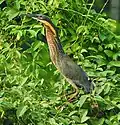Ixobrychus
Ixobrychus is a genus of bitterns, a group of wading bird in the heron family Ardeidae. It has a single representative species in each of North America, South America, Eurasia, and Australasia. The tropical species are largely resident, but the two northern species are partially migratory, with many birds moving south to warmer areas in winter.
| Ixobrychus | |
|---|---|
.jpg.webp) | |
| Little bittern (Ixobrychus minutus) | |
| Scientific classification | |
| Domain: | Eukaryota |
| Kingdom: | Animalia |
| Phylum: | Chordata |
| Clade: | Dinosauria |
| Class: | Aves |
| Order: | Pelecaniformes |
| Family: | Ardeidae |
| Subfamily: | Botaurinae |
| Genus: | Ixobrychus Billberg, 1828 |
| Type species | |
| Ardea minuta Linnaeus, 1766 | |
| Species | |
|
See text. | |
The species of the genus Ixobrychus are all small, with their four larger relatives being in the genus Botaurus. They breed in large reedbeds, and can often be difficult to observe except for occasional flight views due to their secretive behaviour. Like other bitterns, they eat fish, frogs, and similar aquatic life.
Taxonomy
The genus Ixobrychus was introduced in 1828 by the Swedish naturalist Gustaf Johan Billberg who listed two members of the genus but did not specify the type species.[1] This was designated as the little bittern by Witmer Stone in 1907.[2][3] The genus name combines the Ancient Greek ixias, a reed-like plant and brukhomai, to bellow.[4]
The genus contains ten species This includes the New Zealand bittern which is now extinct.[5]
Extant species
| Image | Scientific name | Common Name | Distribution |
|---|---|---|---|
.jpg.webp) | I. minutus | Little bittern | Africa, central and southern Europe, western and southern Asia, and Madagascar |
 | I. dubius | Black-backed bittern | Australia and southern New Guinea |
.jpg.webp) | I. cinnamomeus | Cinnamon bittern | tropical and subtropical Asia from India east to China and Indonesia |
 | I. involucris | Stripe-backed bittern | Colombia, Venezuela, Guyana, Suriname, French Guiana and the island of Trinidad, and in Paraguay, Uruguay, Argentina, Chile and Brazil |
 | I. exilis | Least bittern | southern Canada to northern Argentina |
 | I. sinensis | Yellow bittern | northern Indian Subcontinent, east to the Russian Far East, Japan and Indonesia. |
.jpg.webp) | I. eurhythmus | Von Schrenck's bittern | Indonesia, the Philippines, Singapore, Laos, China and Siberia |
.jpg.webp) | I. sturmii | Dwarf bittern | Angola, Benin, Botswana, Burkina Faso, Burundi, Cameroon, Central African Republic, Chad, Republic of the Congo, Democratic Republic of the Congo, Ivory Coast, Equatorial Guinea, Eswatini, Ethiopia, Gabon, Gambia, Ghana, Guinea, Kenya, Liberia, Malawi, Mali, Mauritania, Mozambique, Namibia, Niger, Nigeria, Rwanda, Senegal, Sierra Leone, Somalia, South Africa, Spain (the Canary Islands), Sudan, Tanzania, Togo, Uganda, Zambia, and Zimbabwe |
 | I. flavicollis | Black bittern | tropical Asia from Pakistan, India, Bangladesh and Sri Lanka east to China, Indonesia, and Australia |
The New Zealand bittern (Ixobrychus novaezelandiae) is extinct.
References
- Billberg, Gustaf Johan (1828). Synopsis Faunae Scandinaviae. Volume 1 Part 2: Aves (in Latin). Holmiae: Ex officina typogr. Caroli Deleen. p. 166.
- Stone, Witmer (1907). "Some changes in the current generic names of North American birds". The Auk. 24: 189–199 [192]. doi:10.2307/4070852. JSTOR 4070852.
- Mayr, Ernst; Cottrell, G. William, eds. (1979). Check-List of Birds of the World. Vol. 1 (2nd ed.). Cambridge, Massachusetts: Museum of Comparative Zoology. p. 237.
- Jobling, James A. (2010). The Helm Dictionary of Scientific Bird Names. London: Christopher Helm. p. 208. ISBN 978-1-4081-2501-4.
- Gill, Frank; Donsker, David; Rasmussen, Pamela, eds. (August 2022). "Ibis, spoonbills, herons, Hamerkop, Shoebill, pelicans". IOC World Bird List Version 12.2. International Ornithologists' Union. Retrieved 25 November 2022.